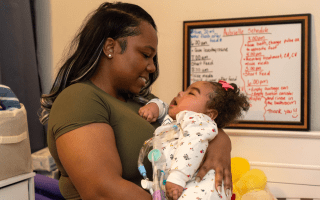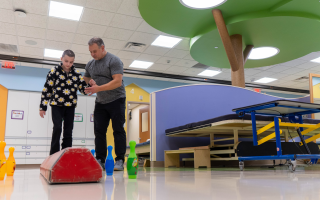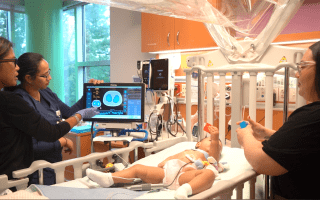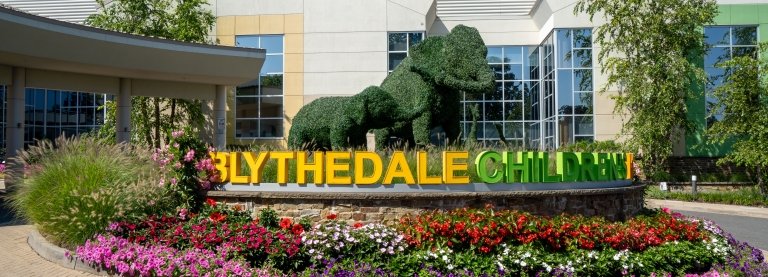Angela's Advice
A Complex Recovery Eased by Child Life, Therapeutic Recreation and Music
Eleven-year-old Angela was diagnosed with neurofibromatosis type 2, a condition that causes non-cancerous tumors to form in the brain, spinal cord, and nerves. She has undergone numerous complicated surgeries, followed by multiple rounds of chemotherapy to prevent the return of tumors that were present in her spine and brain. After her most recent surgery, she was admitted to Blythedale Children’s Hospital for comprehensive therapies to address her neurological deficits and lower extremity weakness.
Upon arriving at Blythedale, Angela said, “When I first came here, a lot of people were coming up to me and meeting me for the first time and I got a little nervous.”
Being in the hospital can be tough for anyone, especially children. Blythedale’s Therapeutic and Developmental Support Services (TDSS) team focuses on each child at Blythedale to help them through their medical journey. Every child is paired with a Certified Child Life Specialist upon admission. The team of certified Child Life specialists are trained in the developmental impact of illness, injury, trauma, and hospitalization.
“Child Life is a profession that is here to help guide children through their medical experience,” said Lesley Phillips, M.Ed., a certified Child Life specialist at Blythedale Children’s Hospital. “Being in a hospital can be very overwhelming for kids so what we do is provide education, support, and preparation for kids to help them cope with the stress of being in the hospital.”
Child Life specialists ease a child’s adjustment to a hospital setting and/or a change in their health status. They help patients prepare for procedures through medical and therapeutic play and promote healthy coping strategies.
“Play is how children talk,” said Phillips. “We’re not going to sit down and have a conversation with kids about what they’re feeling but what we can do through play is help them to express themselves.”
For Angela, the integrated therapeutic approach of Child Life, Therapeutic Recreation and Music Therapy all helped her to grow. Philips explained that while “Child Life is often focused on the child’s coping and emotional well-being, in recreation, it’s about socialization and interaction with peers.”
“The great thing about our program is that it gives our kids a space to come together and have that socialization,” said Andrea Castiello, CTRS, a senior therapeutic recreation specialist. “A lot of kids might feel like they’re missing out on those typical experiences they usually get to have [outside of the hospital]. So having a space for them to all come together is great for a kid like Angela. She got to make to friends, she got to learn social skills and she can take that when she leaves here.”
Castiello went on to explain that “therapeutic recreation is used to address the needs and goals of our patients in a really fun and creative way. It’s really a holistic approach to healing that uses play as a form of therapy.”
Kelsey Mayer, M.S., CCLS, director of the Therapeutic and Developmental Support Services team explained that “we know how important it is to heal both the body and soul together while the amazing clinical team works on helping heal our patients' bodies, we focus on how we can help also heal the child within.”
Prior to arriving at Blythedale, Angela didn’t like to sing out-loud in front of anyone, except her family. Yet through the TDSS department, Angela began to blossom. Reissa Ress, M.A., L.C.A.T., a licensed creative arts therapist and board-certified music therapist, asked Angela if she would sing with her for a contest to potentially win a ukulele. Although Angela was hesitant at first, she and Reissa chose “Talking to the Moon” by Bruno Mars, one of Angela’s favorite songs.
Angela reflected that it was a little hard at first but she went through with it because she believed in herself and knew that everyone believed in her as well.
“There are so many ways that music therapy can help the pediatric population, especially here at Blythedale,” said Ress. “We have many kids that are non-verbal so for them to be able to create a sound or participate in a sound experience, that’s huge.”
She noted that with kids who are meeting physical goals, it helps to add music to that process. “It aids in motivation if music is very important to them and makes that therapy experience better for them,” Ress said. “If it’s a child who is going through a tough time, it may be a way to put everything they’re feeling into a song that we can then process later and look at it in that way. It fits into lots of niches that a lot of other therapies can’t.”
Angela said she’s excited to go home but she’s going to miss all of the new friends that she’s made at Blythedale.
Phillips is proud of all that Angela has accomplished while she’s been at Blythedale.
“Angela is a really special girl,” she said. “She was able to tap into each of our resources and all of us together working with her really got her so far and she really grew so much and flourished emotionally.”
Angela’s advice for anyone who might be nervous?
“Step out of your comfort zone and you’re going to have the best time that you could ever think of.”



